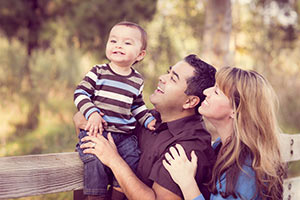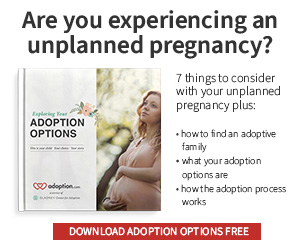ADOPTION IN
Massachusetts

Adoption in Massachusetts is an option for those considering placing a baby for adoption or adopting a child into their own family. One of your first steps in pursuing adoption in Massachusetts will be partnering with an adoption agency that has your best interest at heart.
Adoption Near Me
Looking for more resources in your area? Check out the Adoption Directory for a listing of adoption professionals in your state.

Considering Placing Your Baby or Child for Adoption in Massachusetts? You can learn more here or call an adoption counselor 1-800-236-7898.
Domestic Infant Adoptions can be completed through a Massachusetts adoption agency or adoption attorney. Click here for a directory of adoption service providers in Massachusetts.
International Adoptions must be completed through an accredited adoption agency or attorney. Find an international adoption service provider here.
Foster Care Adoptions in Massachusetts can be completed through the Massachusetts Department of Children and Families (800-543-7508).
Gallery of children waiting to be adopted.
Join the New England adoption group in our community!
I’m considering placing my baby or child for adoption.
Pregnant and have questions? We can help answer your questions by telling us what works best for you.
Are you pregnant and considering adoption? Do you need help getting started?
Click here and help us understand what your needs are and the preferences you have. We can help you get started.
Massachusetts Adoption
By: Heather Pietras-Gladu
Adoption has entered your mind, but you are not sure what Massachusetts adoption looks like or where to start. It depends on where you are in the adoption triad and what type of adoption best suits your needs and desires. This article will look at the steps for biological parents who may want to pursue adoption for their child and the steps for prospective adoptive parents.
How Do I Pursue Placement for My Child?
There are three ways a child is placed for adoption. The first is through a private adoption agency. This is common for domestic infant adoption. These agencies, such as the Gladney Center for Adoption, can help an expectant parent with the decision of whether or not to place the child for adoption. It is important to make sure that the adoption agency you contact has your needs in mind. There are some common things to look for: whether there will be compensation during pregnancy, 24-hour emotional support, and/or the ability for post-adoption contact if desired. We can not stress enough to make sure you feel comfortable with the agency. This is a hard process, and having as much support as you can will help. You may also look for an agency that has post-adoption support.
The next two ways transfer children from foster care into placements. The second way a child can be placed for adoption is through the Department of Children and Families. Massachusetts is a Safe Haven state. The Safe Haven Act of Massachusetts allows a parent to legally surrender newborn infants 7 days old or younger at a police station, fire station, or hospital without facing criminal charges. A parent can also contact the Department of Children and Families with the help of a social worker at the hospital of birth. The Department of Children and Families then can place a child into the foster care system, usually in a pre-approved foster to adopt home.
The third way is through protective concerns. In the state of Massachusetts, an incident of child abuse is reported through a 51A. When a case hits certain risk factors, a child can be placed into the foster care system. The Department then works with the family to attain stabilization and return the child. There are times when the child cannot safely return home, in which case the goal will change to adoption. When a child is in foster care, there is a review every six months. If parents are not meeting the requirements of their service plan, the foster care reviewer can change the goal. The court also can change the goal to adoption after six months of a child being in foster care. There are some cases this will happen sooner but not very often. The Department then looks at kinship (family, immediate friends) or a pre-adoptive placement. There is a state site for waiting children called Mass Adoption Resource Exchange (MARE). They also have other support regarding adoption and families.
There are agencies in Massachusetts that help with international adoptions. These agencies will have the specific requirements for the court and will assist you in handling the proceedings.
State Requirements
One must be at least 18 years old to adopt a child in Massachusetts. One of the adopted parents (sometimes both) must be a legal resident of Massachusetts. There can be waivers done in court for certain circumstances.
A married couple must petition the courts for the child’s adoption together. There may be rare cases where only one parent is required. Single and unmarried parents can adopt. Same-sex couples are also welcome to adopt in Massachusetts. They also provide adoption for stepchildren and family member adoption. You can adopt either through DCF or through a private adoption agency.
An adoption consent form must be filled out. This can be done through DCF or an agency. The adoption consent form is a document that has the biological parents given permission for the adoption. Any child under 18 years old must have the consent of both biological parents or both biological parents must terminate their parental rights in court. In cases where the father is unknown, you will have to petition the last known address. There is a specific form to fill out. Children over the age of 12 must also give consent to their adoption. If a child is married at the time of their adoption, their husband must also give consent. There is a four-day waiting period from the child’s birth until biological parents can sign the consent/voluntary surrender of the child.
Paperwork
Massachusetts adoption, as with any adoption, has a lot of paperwork. The paperwork must be completed on time and in the right order. This is why it is important to find a private agency or go through DCF in order to navigate the judicial system. If you are looking into private adoption, it will be important to consider hiring a lawyer. DCF will have attorneys present to address legal concerns. When the child is being finalized through DCF, the courts will often not allow outside attorneys. The Department, each parent, and child all have their own legal representation. The child also has an adoption social worker that can assist with the packet.
The first required document is the Petition for Adoption or an affidavit for adoption. This will be completed by the agency and entered by the lawyer. The next thing will be a CARI-Court Activity Record Information. This is a background check done on prospective adoptive parents to rule out any concerns. When that comes back, the agency or DCF will file an affidavit disclosing care or custody proceedings. This is where a potential name change can be entered. At this time, home study information will be entered, or you can ask for a waiver. If you ask for a waiver, you must include specific reasons. Probation can come out to check the home regardless of a waiver. During this time, if there is not a father listed or inactive, the court will ask the Department or Agency to submit a parental responsibility claim. This will be the only fee associated with the actual court. This allows the court to publish the claim to see if any father comes forward. If a father comes forward, he can ask for paternity testing and proceed for custody. Oftentimes DCF will have completed this before the filing. Private agencies have their own policies regarding how this is done.
When a child is surrendered, there are specific forms that are filled out. There may also be other documents that show parental rights have been terminated at a previous trial. During this time the court will ask the agency or DCF to request a search in the Federal and Central Registers of missing children to make sure there has been no foul play. Once all of this paperwork comes back and the court receives the approved home study, the court can file a hearing for 30 days out. One must keep in mind that the courts are backed up due to COVID-19 restrictions, so dates may be pushed back.
There are no fees for a Massachusetts Adoption. The only fee, again, will be to pay for a sheriff or constable to serve the parental responsibility waiver. The waiver can be done in person or by mail. That said, private agencies do have fees for processing the adoption. DCF does not charge a family for any fees. Often, they can offer adoption subsidies for certain children. Some examples that qualify for subsidy are sibling adoptions and special need adoptions.
What Happens in Court?
When you get your court date, it is important to meet with your agency or DCF worker to check the final paperwork. It will seem like a lot of paperwork, but be sure to read them all for accuracy. This will include your child’s possible name change. A typo can halt the process, and if caught early, it can be updated without concern. You will need certain documents notarized before the court which can be done at local banks. Some DCF offices and agencies have a notary available. Arrive at court on time, but know that they do call cases at random. They try to do the adoption cases early because children are involved. Massachusetts requires children to be present during the hearing, so it may be important to prep younger ones. There are current restrictions due to COVID-19 on who can come to the court. Some cities are still doing the adoptions on zoom. There is no eating or drinks allowed in court, and phones must be turned off. You may get special permission for cameras if the judge allows. Usually, it is not a problem. It will be encouraged to dress up for this occasion but is not a formal requirement.
During the hearing, the judge will ask each parent and child (when applicable) to be sworn in. The judge will then acknowledge the adoption and complete the legal part. You may hear DCF ask for other things to be closed during the proceedings in order to close the adoption case. Most judges allow pictures to be taken with them with your family. Once done, you will be asked to leave the building.
The court honors adoptions once a year. This is National Adoption Day in November. The actual date does change. On this day, the court opens only for adoption cases. There are often vendors that have kid-friendly activities. My first adoption was done on this day, and it added a special twist. If at all possible, I encourage you to attend on this day.
Post-Adoption
Massachusetts does offer post-adoption services that can be located at Mass.gov. These include agencies that provide support around placement and post-placement. The court can make it possible for a child to seek out their adoptive file. This is a special request; otherwise, it is not fully unsealed. Adoptees can also request their pre-adoptive birth certificates by filing with the court.
There are some situations where you will qualify for a subsidy. In Massachusetts, you will need to provide documentation once a year around the date of adoption to assure it continues. This will be a letter from your child’s pediatrician or any other important providers. If you adopt a child with special needs, you can ask for PACT money. This requires more documentation for all of the providers your child sees. Your family may also qualify for adoption tax credit or tax-exempt status within the state of Massachusetts.
Massachusetts is a state that provides many options for adoption. They have policies that address discrimination against prospective adoptive parents. They are also mindful of who they place children with and try to make the best fit. Although the court does not charge fees for adoptions, private agencies will have fees related to processing home studies and paperwork. Hiring an attorney is recommended and even necessary when navigating a private adoption. When adopting within the foster care system, they will provide lawyers for the child. There will also be an adoption social worker that will assist with the process. At times, the paperwork and waiting will feel overwhelming, but I can assure you it does work out.
Remember that when growing your family, it is rare that you can do it alone. Reaching out for additional support after placement and finalization is important. Sites such as Adoption.org can help navigate your questions. You can find stories from others who have experienced the same thing.
Massachusetts Adoption Guide
The information contained on this website is for educational purposes only and is not intended to be a substitute for professional legal advice. Always seek the advice of a licensed and qualified professional. While the content of this website is frequently updated, information changes rapidly, and therefore, some information may be out of date, and/or contain inaccuracies, omissions, or typographical errors.
Can I Adopt in Massachusetts?
Applicants must be at least 18 years old to foster, 21 to adopt. You can be married, single, or divorced. You can own or rent a home. Your home needs to have adequate space, privacy, and safety for all family members. Children of the same gender may share a room. You can have up to 6 children at any given time living in your home, including biological, adoptive, and day care children. Newborns under the age of 1 may share the parent’s bedroom. Parents need to attend a MAPP (Model Approach to Partnerships in Parenting) 10 week training course in order to prepare for adoption. Applicants must complete a home study to be approved for adoption.
What Adoption Regulations Exist in Massachusetts?
Advertising: The Department of Children and Families is allowed to implement a public adoption information program, including educational and informational print, audio, visual, and other electronic advertisements, public service announcements, and a toll-free hotline. No person or agency is allowed to advertise for the placement or reception of a child under 16 for adoption purposes unless the advertisement is placed by a licensed adoption agency. No person can place or receive a child for adoption purposes except a licensed adoption agency, unless the child is a blood relative. 119, § 391/2; 15D, § 6
Relinquishment: Consent cannot be given until at least 4 days after the birth of the child. Consent given in accordance with Massachusetts law is final and irrevocable from the date of execution. 210, § 2
Birth parent expenses: No laws currently regulate private domestic adoption expenses in Massachusetts.
Post-adoption contact agreements: To be enforceable, contact agreements need to be in writing, approved by the court prior to the adoption decree, incorporated but not merged into the adoption decree, and shall survive as an independent contract. Agreements are approved when the court finds that the agreement is in the child’s best interest, is fair and reasonable, and all parties enter into the agreement knowingly and voluntarily. The agreement ceases to be enforceable when the adoptee turns 18. 210, § 6C-6D
Birth father rights: Massachusetts currently does not have a putative father registry. Instead, paternity may be established by filing with the courts an acknowledgement of parentage executed by both parents to establish paternity. An acknowledgement of paternity is sufficient basis for seeking a court order of support, custody, or visitation in respect to the child without further proceedings to establish paternity. A putative father may also file parental responsibility claim, giving him the right to receive notice of adoption proceedings. 209C, §§ 2 and 11; 210, § 4A
Finalization: The child must live with hopeful adoptive parents for at least 6 months before adoption finalization.
Is Adoption Assistance Available in Massachusetts?
Can I adopt a Child from another country?
It is always possible to adopt a child from another country, even if you live in the United States. Children under 18 adopted from a Hague Convention country entering the U.S. with an IH-3 visa may automatically receive U.S. citizenship.
Children adopted from a non convention country must qualify as orphans before receiving U.S. citizenship. When U.S. citizens finalize an adoption abroad, they must apply to the USCIS for an IR-3 visa for the child. An IR-3 visa classifies the child as an immigrant and provides the child with citizenship upon arrival in the States.
Massachusetts currently gives full effect and recognition to adoptions completed abroad in compliance with foreign and U.S. law.
State Contacts
Gallery of children waiting to be adopted: https://adoption.com/photolisting?page=1&search_type=region&range=UnitedStates
State subsidy contact:
Director of Adoption Support Services
Massachusetts Department of Children & Families
Adoption Support Unit
600 Washington Street, 6th Floor
Boston, MA 02111
800-835-0838
fax: 617-261-7437
Summary
Applicants must be at least 18 years old to foster, 21 to adopt. You can be married, single, or divorced. You can own or rent a home. Your home needs to have adequate space, privacy, and safety for all family members. Children of the same gender may share a room.
The department is allowed to advertise, including educational and informational print, audio, visual, and other electronic advertisements, public service announcements, and a toll-free hotline. No person or agency is allowed to advertise for the placement or reception of a child under 16 for adoption purposes unless the advertisement is placed by a licensed adoption agency.
Consent cannot be given until 4 days after birth. Consent given in accordance with Massachusetts law is irrevocable.










